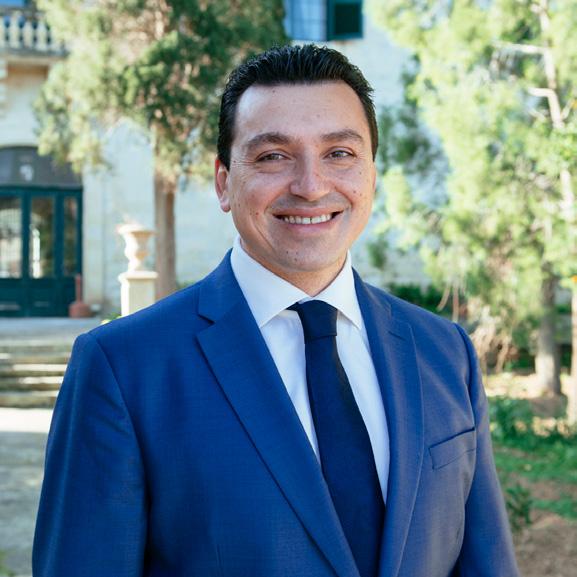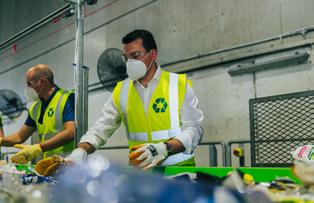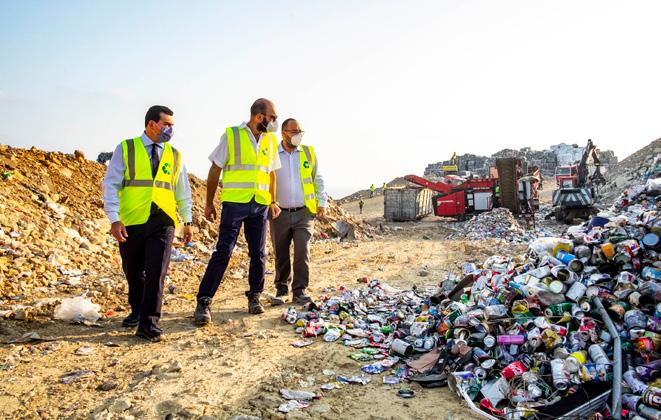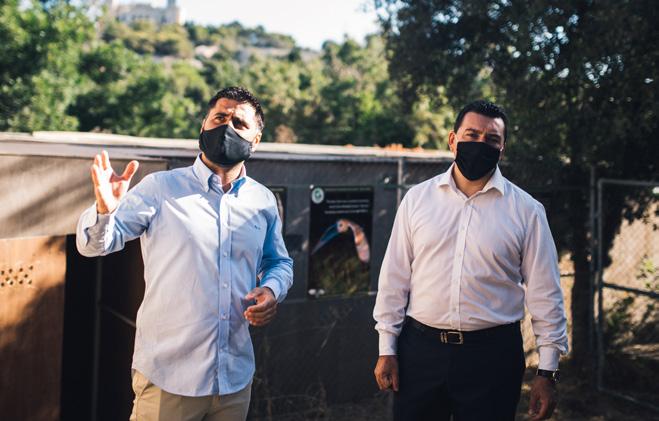
7 minute read
SHAPING THE FUTURE OF MALTA’S LANDSCAPE
from MONEY ISSUE 61
Hon. Aaron Farrugia is the minister responsible for the environment, climate change, and planning. That includes waste management, environmental regulation, and entities such as the Planning Authority (PA), the Environment and Resources Authority (ERA), WasteServ, Ambjent Malta, and the Resource Recovery and Recycling Agency (RRRA). MONEY writer Dayna Camilleri Clarke spoke to the minister to understand what's in the pipeline and the current work being done.
Earlier this year you announced a waste-to-energy plant to cater for 40% of non-recyclable waste. Is it 2026 a realistic time-frame? What additional steps are you taking to support sustainable development with regards to waste management?
Advertisement
I don't mind saying that I believe waste is one of the most significant challenges that our country faces, no less because it can have repercussions on many different fronts. Therefore, the largest ever investment in the waste management sector we've ever had is necessary. It will not only take Malta to a new level in waste management but will also improve our overall environmental performance and help us reach our recycling targets.
New state-of-the-art waste management facilities will allow waste streams being reutilised to their full potential: the investment includes pillars in waste management such as the much-needed waste-to-energy plant which will significantly limit our landfilling volumes, a new plant for the management of dry recyclables, a plan to treat organic waste to extract energy and produce compost for use in agriculture, as well as the replacement of the clinical and abattoir waste incinerator.
We aim to adopt a circular economy approach: the waste-to-energy plant will handle waste that cannot be recycled or recovered in other ways and will transform them into energy.
Time-frames are tight, but we are determined to have this plant up and running as soon as possible order to begin moving farther away from the predominant reliance on landfilling: 2026 was the original target date, but we want to be as ambitious as possible. We have a holistic infrastructural strategy that will also be supported by a new waste management plan.
We have signed the license agreement which will allow Malta to have a refunding system for beverage containers on a national scale. The scheme will not only benefit our environment but also provide opportunities that the circular economy brings, by reusing resources and changing our cultural attitudes to appreciate the

economic value of recyclable resources. Considering the Covid-19 pandemic and its impact on our country's economy, this scheme becomes even more important, as experience teaches us that similar schemes create green jobs. We are also implementing several measures, many of which will be introduced through the single-use plastics strategy. We need to use this to strengthen the element of sustainable consumption: plastic is increasingly problematic due to our increasing consumption. The impact is even more significant because the sea has no borders.
Can you tell us more about the local and national urban greening projects you have on the horizon?
I believe the time has come to focus on ways in which to improve the environment of our communities, and this year we launched several new environmental projects. Across nineteen different localities, to be exact. These were greening projects in urban areas such as streets, squares, and other public spaces that are devoid of greenery and the

associated physical and psychological benefits. The local councils themselves chose the exact sites, and the species of plants were chosen carefully to be suitable for the area, based on their environmental conditions, and carried out following ERA's landscaping guidelines.
While it is all well and good to have zones in rural areas where families can visit, we need to make sure that green zones are also present at the heart of our localities, where people live, work, and spend most of their time. These projects are a first step towards the holistic vision for the environment sector, and I am committed to continuing working towards a shift in mentality in this regard.
In fact, this is just the beginning. We are looking towards a green revolution in the country. We are investing millions in vertical green walls at the Hamrun-Marsa Bypass and three industrial zones. We also launched an innovative way to tackle environmental planning: a design and build competition among the country's architects. An unprecedented investment of €3 million in environmental projects under the concept of Green and Blue Infrastructure was launched in three urban areas in three localities as part of a joint initiative with the Parliamentary Secretariat for Citizenship and Communities. These projects will kick off with a competition for professionals in the field and will be chosen based on their environmental benefits and health benefits for residents. →
I believe Malta needs projects which genuinely are in line with our vision to move from grey to green in terms of infrastructure, and which truly benefit the health of residents and improve wellbeing. This is why we are looking at less traditional ways of tackling national projects, and because the time has come to revolutionise the concept of intelligent planning in our country.
What is the barn own project? Why is this important?
Conserving our environment and protecting our biodiversity is crucial. These are the pillars of functioning ecosystems

and sustainability. It is our duty to promote and invest in initiatives that preserve our environment and our species for future generations: because we owe them as much. Our natural heritage mustn't become a distant memory.
The barn owl conservation project led by the Federation for Hunting and Conservation (FKNK) aims to re-introduce barn owls into the wild around Malta and Gozo through techniques successfully used by falconers around the world. It will effectively reintroduce the barn owl back to its natural habitat and extend to other urban and rural areas in the Maltese Islands after this. Such processes of reintroduction and conservation are both critical approaches in conservation efforts: they improve the conservation status of species that have suffered population decline usually related to human impact.
The project is taking place at Razzett talBaghal in Buskett, and the area of Buskett itself is significant -- it is amongst the most important Natura 2000 sites in Malta. The general area is also essential grounds for many types of flora and fauna. Apart from being an N2K site, it was designated as a Special Area of Conservation and Special Protection Area. We've also developed a management plan for Buskett, and implemented a project to increase woodland coverage, encourage citizen engagement and manage the site. To further implement and involve civil society, therziezetin the area were assigned specific funding and functions.
The PM says construction will be vital in the post-COVID recovery: do you agree that Malta should press on the accelerator to kickstart the economy? You also have spoken of the 'balance' between construction and environment, what challenges do you face here? How are you striving for balance?
A Public health is a priority for the Government. But so are social issues and the economy. Our most robust industries will drive our post-COVID recovery - and the construction industry is indeed a significant part of our country's economy, employing thousands of people.
In the same way, the Prime Minister was correct to stress the importance of the construction industry post-COVID, I believe he was right to bring planning and environment back under the same ministry. This is the first vital step towards achieving the 'balance' that I often speak of and which is necessary to bridge the gap between environment and development. The second step is the strong policies we are putting in place, and it's not just talk: the review of the rural policy, the fuel stations policy, SPED review, light pollution guidelines, increased protection of scheduled buildings, and other policies in the works will lead to precisely this end. We are also thinking long-term and moving away from electoral cycles, pouring our energy and resources into the development of a National Strategy for the environment for the next thirty years. I strongly believe in both intelligent planning and continuous dialogue, and the Government has set a clear path towards achieving a stable balance between construction, economic strength, green projects and overall wellbeing.

Dayna is a senior speech therapist by day and feature writer by night. When she’s not busy fixing words, she is travelling the world to add to her fridge magnet collection.










